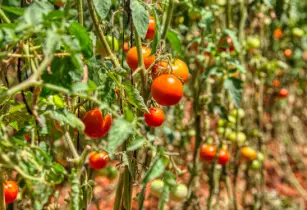The United Nations World Food Programme (WFP), in partnership with the African Group of Ambassadors and the Embassy of the Federative Republic of Brazil, recently launched an Integrated Community Based Food Systems Project in the rural district of Tsumkwe of Otjozondjupa Region in Namibia
“The project will help bring about food security in the country and will go a long way in realising the UN’s second Sustainable Development Goal of attaining Zero Hunger while providing a diverse food basket to address nutritional requirements for clinics, schools and the local community,” said Netumbo Nandi-Ndaitwah, deputy prime minister of Namibia and minister of International Relations and Cooperation.
The settlement, predominantly occupied by indigenous groups, has been growing vegetables as a supplement to their traditional approach of surviving by hunting antelopes and gathering wild plants. Since June 2021, as many as 45 community members have grown tomatoes, carrots, cabbages, spinach, and pumpkins. The project – placed purposefully next to a clinic where pregnant and breast-feeding women receive access to health care and nutritional advice – gives local people access to nutritious food for a balanced and healthy diet.
“To address poverty, food and nutrition insecurity, it is important to work towards socio-economic and environmental outcomes at both community and national-level,” said George Fedha, Namibia country director. As a result, WFP Namibia aims to enhance and develop sustainable food systems across all 14 Regions in Namibia.
The approach aims to enhance inclusiveness, ensuring economic and social inclusion for localised participants, including smallholder farmers and women, while minimising negative environmental impacts.





